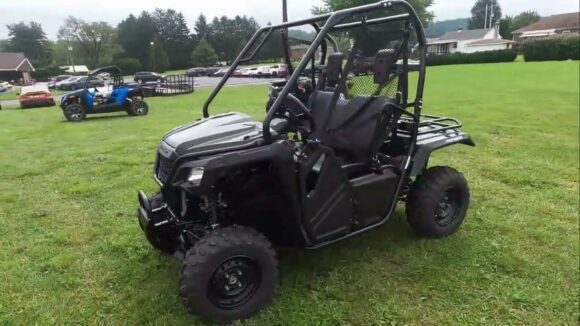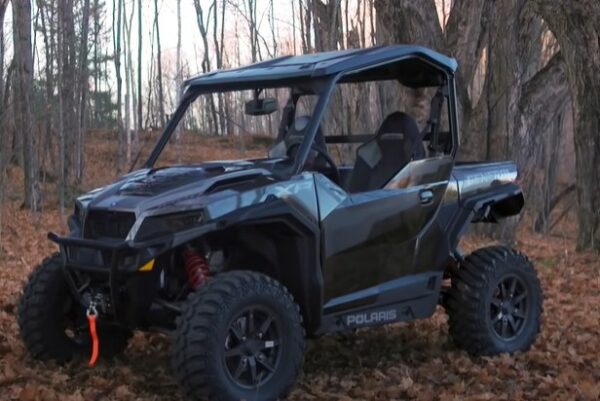Are you a proud owner of a Honda Pioneer 500 or considering purchasing one? While the Honda Pioneer 500 is known for its durability and reliability, like any vehicle, it may encounter some problems along the way.
In this blog post, we will discuss common issues that Honda Pioneer 500 owners may face and how to address them.
Whether you’re on your first adventure or a seasoned Pioneer 500 owner, this post will provide valuable insights to keep your off-road vehicle running smoothly.

7 Common Honda Pioneer 500 Problems (with fixes)
1. Engine Issues
One significant engine issue reported by Honda Pioneer 500 owners is overheating. This can be caused by a variety of factors such as a clogged cooling system due to dirt and debris or a malfunctioning water pump. To prevent overheating, make sure to regularly clean the cooling system and replace any worn-out parts.
Another common engine issue is oil leaks, which can be caused by a faulty gasket or seal. If left unaddressed, oil leaks can lead to more significant engine problems and costly repairs. It is essential to regularly check for oil leaks and promptly replace any damaged gaskets or seals.
Additionally, some owners may experience issues with the fuel system, including a clogged fuel filter or a malfunctioning fuel pump. Regularly cleaning and maintaining the fuel system can help prevent these problems.
If you encounter any engine issues, it is best to consult a certified mechanic for proper diagnosis and repairs. Ignoring engine problems or trying to fix them yourself can lead to further damage and costly repairs in the future.
2. Electrical Issues
Some of the most common electrical problems reported by Pioneer 500 owners include malfunctioning lights, dead batteries, or issues with the winch.
To prevent these issues, it is essential to regularly inspect and maintain your Pioneer 500’s battery and electrical connections. Check for any signs of corrosion or damage and replace worn-out parts promptly. Also, make sure all wiring is properly secured to avoid loose connections.
Some practical solutions for common electrical problems in the Honda Pioneer 500 include replacing a faulty battery or repairing damaged wiring connections. It is also essential to follow the manufacturer’s recommendations for regular maintenance to prevent future electrical issues.
If you encounter any electrical problems, it is best to seek the help of a trained mechanic.
Tampering with the electrical system can be dangerous and may void your warranty. A certified mechanic will have the expertise and knowledge to diagnose and fix any electrical issues in your Pioneer 500 safely and effectively.
3. Transmission Problem
Transmission problems are another area that Honda Pioneer 500 owners may encounter. These issues can manifest themselves in a number of ways including difficulty shifting gears, gear slippage, or even total loss of transmission. The root cause can vary, from a worn-out clutch to a more unfortunate mechanical failure in the transmission system.
To prevent these issues, it’s important to keep up with regular maintenance. This includes the oil and filter changes as recommended by Honda and ensuring that the right type and quality of transmission fluid is used. Check for any leaks regularly, as low fluid levels can lead to transmission problems.
In case you experience any transmission issues, it’s recommended to have a certified Honda mechanic inspect your vehicle. Attempting to fix transmission problems yourself can result in further damage and costly repairs.
4. Suspension Problem
Some common issues with the suspension system include issues with shocks, struts, or other components such as ball joints or control arms.
Issues with shocks and struts can manifest in various ways, including a bumpy ride, excessive bouncing or swaying while driving, and uneven tire wear. This can be caused by worn-out or damaged shocks or struts, which are responsible for absorbing impact and providing a smoother ride.
To address shock and strut issues, it is important to regularly inspect these components for any signs of wear or damage. If they appear to be in good condition but you’re still experiencing problems, it may be time for a replacement.
Issues with other suspension components such as ball joints or control arms can also result in a bumpy ride, steering wheel vibration, or unusual noises while driving. These parts are responsible for connecting the suspension system to the wheels and can wear out over time or due to extreme off-roading conditions.
To prevent these problems, it is important to regularly inspect and maintain all suspension components. If an issue is detected, it is best to have a certified mechanic replace the worn-out part with a high-quality replacement.
5. Brakes
Brake problems can include issues with brake failure, excessive wear, or inefficiency. To avoid these issues, regularly check the brake pads for wear and replace them when necessary. Also, ensure that the brake fluid is at the recommended level and free from contaminants.
If you experience any brake problems, such as a spongy or unresponsive brake pedal, it is essential to have them checked by a trained mechanic immediately. Ignoring brake issues can lead to accidents and put your safety at risk.
6. Drivetrain Issues
Some common drivetrain issues include difficulty shifting gears, grinding noises, or vibrations while driving. To prevent these issues, make sure to regularly inspect and maintain your Pioneer 500’s drivetrain components, such as the driveshaft, CV joints, and differential.
If you experience any drivetrain problems, it is best to consult a certified mechanic. They will be able to diagnose the issue and recommend the necessary repairs or replacements. Ignoring drivetrain issues can lead to more significant problems and potentially cause damage to other components of your Pioneer 500.
7. Build Quality
While the Honda Pioneer 500 is known for its durability, some owners have reported build quality issues with their vehicles. These can include loose or missing bolts, faulty welds, and plastic parts breaking easily. These issues can be frustrating as they can affect the overall performance and safety of your Pioneer 500.
One way to prevent these problems is to thoroughly inspect your vehicle before purchasing it and to regularly check for any loose or faulty parts. If you encounter any build quality issues, contact your local Honda dealer to address the issue. In some cases, they may be able to replace or repair the affected parts under warranty.
Another solution is to invest in aftermarket upgrades that can improve the overall build quality of your Pioneer 500. These can include stronger bolts, reinforced welds, and more durable plastic parts. While these upgrades may come at an additional cost, they can provide peace of mind and prevent future build quality issues.
Maintenance and Troubleshooting
Preventative Maintenance:
Here are some tips to help you maintain your off-road vehicle:
- Follow the Recommended Maintenance Schedule: The first step in preventative maintenance is following the manufacturer’s recommended maintenance schedule. This includes regular oil and filter changes, as well as other routine checks and replacements.
- Use High-Quality Fuel: Using low-quality fuel can cause issues with the engine, leading to poor performance and potential damage. Make sure to use high-quality fuel from reputable sources.
- Inspect and Maintain Tires: Off-roading can put a lot of stress on your tires, so it’s essential to regularly inspect them for wear and tear. Rotate your tires every 3,000-5,000 miles and replace them as needed.
- Keep the Air Filter Clean: A dirty air filter can restrict airflow to the engine, causing performance issues. Make sure to clean or replace your air filter regularly.
- Check all Fluid Levels: Regularly check and top-up all fluid levels, including coolant, brake fluid, and transmission fluid. These fluids are essential for keeping your Pioneer 500 running smoothly.
- Store Your Vehicle Properly: When not in use, make sure to store your Honda Pioneer 500 in a dry and secure location to protect it from the elements and potential damage.
Troubleshooting Guide:
Here is a guide to diagnosing and fixing some known issues:
- Engine Problems:
Difficulty starting the engine: Check the battery, spark plug, and fuel system for any issues. If everything seems fine, it could be a problem with the starter motor or ignition switch.
Stalling at low speeds: This could be due to a clogged air filter, dirty fuel injectors or throttle body, or issues with the carburetor. Cleaning or replacing these components usually solves the issue.
Unusual engine noises: If you hear knocking, clicking, or grinding noises coming from the engine, it could be a sign of worn-out parts. Consult a mechanic for a thorough inspection and possible replacement of the affected components.
- Electrical Issues:
Malfunctioning lights: Check the bulbs, fuses, and wiring for any damage or loose connections. If these are intact, it could be an issue with the switch or relay.
Dead battery: Make sure to regularly charge your battery and keep it clean. If you still encounter issues, it may be time for a replacement.
Winch problems: Inspect the winch motor and wiring for any issues. If these seem fine, it could be an issue with the solenoid or remote control.
- Suspension Troubles:
- Bumpy ride: This could be due to worn-out shocks or struts. Have them inspected and possibly replaced if needed.
- Unstable handling: Check the tie rods, ball joints, and control arms for any damage or wear. These components are crucial to the stability of your vehicle and should be replaced promptly if found faulty.
- Unusual noises: If you hear squeaking, clunking, or grinding sounds from the suspension system, it could be a sign of worn-out bushings or bearings. Have these replaced to restore smooth and quiet operation.
In Summary
While Honda Pioneer 500 is known for its durability and reliability, it is not immune to common problems that can arise with any vehicle. Regular maintenance and prompt attention to any issues can help prevent these problems from becoming more significant in the long run.
However, it is always best to consult a certified mechanic for any concerns or issues with your Pioneer 500. With proper care and attention, you can enjoy many adventures without worrying about unexpected problems with your off-road vehicle.


